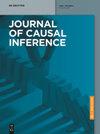双重机器学习和自动混淆选择:一个警世故事
IF 1.7
4区 医学
Q2 MATHEMATICS, INTERDISCIPLINARY APPLICATIONS
引用次数: 7
摘要
双机器学习(DML)已经成为一种越来越流行的高维环境中自动变量选择的工具。尽管处理大量潜在协变量的能力可以使可观测选择假设更加合理,但同时也存在内生变量被包括在内的风险,这将导致违反条件独立性。本文证明了DML对协变量空间中仅包含少数“坏控制”非常敏感。由此产生的偏差随理论因果模型的性质而变化,这引起了人们对以数据驱动的方式选择控制变量的可行性的关注。本文章由计算机程序翻译,如有差异,请以英文原文为准。
Double machine learning and automated confounder selection: A cautionary tale
Abstract Double machine learning (DML) has become an increasingly popular tool for automated variable selection in high-dimensional settings. Even though the ability to deal with a large number of potential covariates can render selection-on-observables assumptions more plausible, there is at the same time a growing risk that endogenous variables are included, which would lead to the violation of conditional independence. This article demonstrates that DML is very sensitive to the inclusion of only a few “bad controls” in the covariate space. The resulting bias varies with the nature of the theoretical causal model, which raises concerns about the feasibility of selecting control variables in a data-driven way.
求助全文
通过发布文献求助,成功后即可免费获取论文全文。
去求助
来源期刊

Journal of Causal Inference
Decision Sciences-Statistics, Probability and Uncertainty
CiteScore
1.90
自引率
14.30%
发文量
15
审稿时长
86 weeks
期刊介绍:
Journal of Causal Inference (JCI) publishes papers on theoretical and applied causal research across the range of academic disciplines that use quantitative tools to study causality.
 求助内容:
求助内容: 应助结果提醒方式:
应助结果提醒方式:


